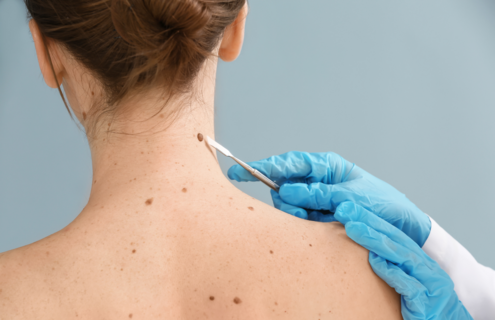
Skin cancer is the most common type of cancer in the U.S. It may surprise you to learn that Vermont has the single highest incidence of melanoma, the most aggressive form of skin cancer, in the U.S.
There are several risk factors for skin cancer, including:
- age
- gender
- having light-colored skin
- exposure to ultraviolet (UV) rays through sunlight
- having a weakened immune system
- a personal or family history or certain skin conditions
- exposure to radiation or other chemicals
While some of these risk factors, can’t be changed, there are steps you can take to lower your risk. In particular, sun safety is very important. Sun safety means avoiding sun exposure when the UV rays are strongest, between 10 am and 4 pm. It also means wearing a broad spectrum sunscreen of at least SPF 30, wearing sun protective clothing such as long sleeves and pants, a wide-brimmed sun hat and sun glasses.
It is also important to have your skin checked regularly. Also learn the patterns of your own skin, such as moles, freckles and blemishes so you can notice any changes. Signs of skin cancer may include changes in the size, shape, color, or sensitivity of a mole or other skin lesion.
Resources
There are a number of informational and support resources available to help you know more about skin cancer, its treatment and how to live with it.
Visit The American Cancer Society for information on all types of skin cancer, facts and figures and prevention strategies. The ACS offers a number of tools and resources including image galleries, 3D interactive skin procedures, skin cancer videos, fact sheets that you can download, and even a skin safety quiz.
The National Cancer Institute also provides in-depth, patient-friendly information and resources about skin cancer. Learn about treatment types, causes and prevention, screening, statistics and how to protect yourself and your family, as well as the latest advancements in research.
To learn more about the Dartmouth Cancer Center Melanoma and Skin Cancer Program, visit cancer.dartmouth.edu/melanoma-skin.